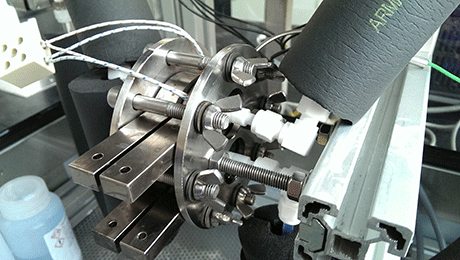Hydrogen has long been an interesting material as energy carrier in a zero emission society based on sustainable energy solutions. However, most hydrogen today is made from natural gas, making it neither zero emission or truly sustainable. Therefore, there is a need to improve the existing electrolyser technologies, which are capable of splitting water into hydrogen and oxygen using electricity. Provided that the energy supplied is from renewable energy sources such as wind, solar or hydropower, this can produce true zero emission hydrogen.
This project revolves around achieving efficient water electrolysis using the cheap materials compatible with alkaline systems. Using anion exchange membranes and novel non-noble catalysts it should be possible to achieve efficiencies comparable to the competing PEM-EC and SOEC technologies, but at reduced costs. There have been ongoing work on both non-noble catalysts and anion exchange membranes, but cells demonstrating the benefits of the novel materials in a zero gap configuration are missing.
More specifically, this project involves
- Design and construction of suitable test stations capable of increased temperature and pressures using concentrated alkaline electrolyte.
- Development of electrodes, i.e. examining different fabrication routes, catalysts, binders, substrates, loading etc.
- Testing of full electrolyser cells in said test stations using the fabricated electrodes to compare performance of system components, such as membranes, catalysts, electrodes, or operating conditions e.g. temperature and pressure.
- Durability tests of catalysts, membranes and electrodes under real cell conditions.
